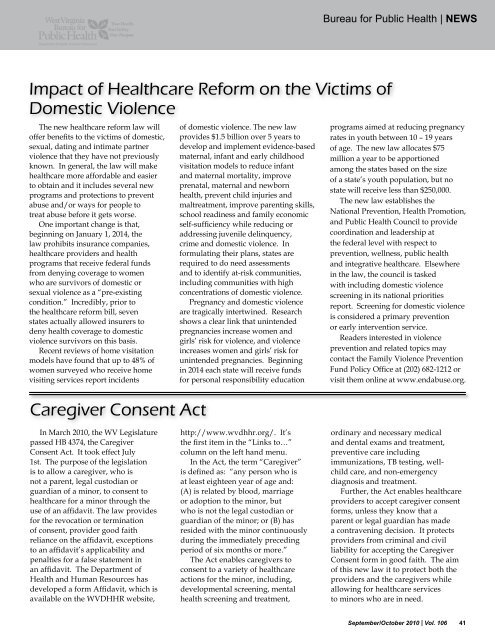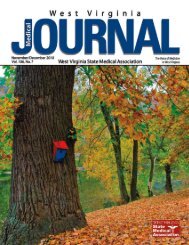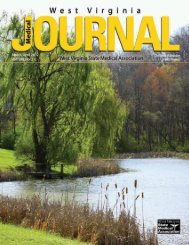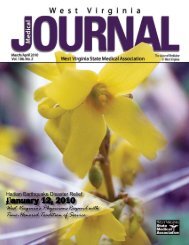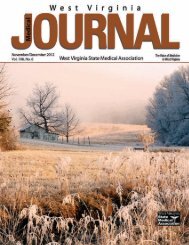September/October - West Virginia State Medical Association
September/October - West Virginia State Medical Association
September/October - West Virginia State Medical Association
You also want an ePaper? Increase the reach of your titles
YUMPU automatically turns print PDFs into web optimized ePapers that Google loves.
Bureau for Public Health | NEWS<br />
Impact of Healthcare Reform on the Victims of<br />
Domestic Violence<br />
The new healthcare reform law will<br />
offer benefits to the victims of domestic,<br />
sexual, dating and intimate partner<br />
violence that they have not previously<br />
known. In general, the law will make<br />
healthcare more affordable and easier<br />
to obtain and it includes several new<br />
programs and protections to prevent<br />
abuse and/or ways for people to<br />
treat abuse before it gets worse.<br />
One important change is that,<br />
beginning on January 1, 2014, the<br />
law prohibits insurance companies,<br />
healthcare providers and health<br />
programs that receive federal funds<br />
from denying coverage to women<br />
who are survivors of domestic or<br />
sexual violence as a “pre-existing<br />
condition.” Incredibly, prior to<br />
the healthcare reform bill, seven<br />
states actually allowed insurers to<br />
deny health coverage to domestic<br />
violence survivors on this basis.<br />
Recent reviews of home visitation<br />
models have found that up to 48% of<br />
women surveyed who receive home<br />
visiting services report incidents<br />
Caregiver Consent Act<br />
of domestic violence. The new law<br />
provides $1.5 billion over 5 years to<br />
develop and implement evidence-based<br />
maternal, infant and early childhood<br />
visitation models to reduce infant<br />
and maternal mortality, improve<br />
prenatal, maternal and newborn<br />
health, prevent child injuries and<br />
maltreatment, improve parenting skills,<br />
school readiness and family economic<br />
self-sufficiency while reducing or<br />
addressing juvenile delinquency,<br />
crime and domestic violence. In<br />
formulating their plans, states are<br />
required to do need assessments<br />
and to identify at-risk communities,<br />
including communities with high<br />
concentrations of domestic violence.<br />
Pregnancy and domestic violence<br />
are tragically intertwined. Research<br />
shows a clear link that unintended<br />
pregnancies increase women and<br />
girls’ risk for violence, and violence<br />
increases women and girls’ risk for<br />
unintended pregnancies. Beginning<br />
in 2014 each state will receive funds<br />
for personal responsibility education<br />
programs aimed at reducing pregnancy<br />
rates in youth between 10 – 19 years<br />
of age. The new law allocates $75<br />
million a year to be apportioned<br />
among the states based on the size<br />
of a state’s youth population, but no<br />
state will receive less than $250,000.<br />
The new law establishes the<br />
National Prevention, Health Promotion,<br />
and Public Health Council to provide<br />
coordination and leadership at<br />
the federal level with respect to<br />
prevention, wellness, public health<br />
and integrative healthcare. Elsewhere<br />
in the law, the council is tasked<br />
with including domestic violence<br />
screening in its national priorities<br />
report. Screening for domestic violence<br />
is considered a primary prevention<br />
or early intervention service.<br />
Readers interested in violence<br />
prevention and related topics may<br />
contact the Family Violence Prevention<br />
Fund Policy Office at (202) 682-1212 or<br />
visit them online at www.endabuse.org.<br />
In March 2010, the WV Legislature<br />
passed HB 4374, the Caregiver<br />
Consent Act. It took effect July<br />
1st. The purpose of the legislation<br />
is to allow a caregiver, who is<br />
not a parent, legal custodian or<br />
guardian of a minor, to consent to<br />
healthcare for a minor through the<br />
use of an affidavit. The law provides<br />
for the revocation or termination<br />
of consent, provider good faith<br />
reliance on the affidavit, exceptions<br />
to an affidavit’s applicability and<br />
penalties for a false statement in<br />
an affidavit. The Department of<br />
Health and Human Resources has<br />
developed a form Affidavit, which is<br />
available on the WVDHHR website,<br />
http://www.wvdhhr.org/. It’s<br />
the first item in the “Links to…”<br />
column on the left hand menu.<br />
In the Act, the term “Caregiver”<br />
is defined as: “any person who is<br />
at least eighteen year of age and:<br />
(A) is related by blood, marriage<br />
or adoption to the minor, but<br />
who is not the legal custodian or<br />
guardian of the minor; or (B) has<br />
resided with the minor continuously<br />
during the immediately preceding<br />
period of six months or more.”<br />
The Act enables caregivers to<br />
consent to a variety of healthcare<br />
actions for the minor, including,<br />
developmental screening, mental<br />
health screening and treatment,<br />
ordinary and necessary medical<br />
and dental exams and treatment,<br />
preventive care including<br />
immunizations, TB testing, wellchild<br />
care, and non-emergency<br />
diagnosis and treatment.<br />
Further, the Act enables healthcare<br />
providers to accept caregiver consent<br />
forms, unless they know that a<br />
parent or legal guardian has made<br />
a contravening decision. It protects<br />
providers from criminal and civil<br />
liability for accepting the Caregiver<br />
Consent form in good faith. The aim<br />
of this new law it to protect both the<br />
providers and the caregivers while<br />
allowing for healthcare services<br />
to minors who are in need.<br />
<strong>September</strong>/<strong>October</strong> 2010 | Vol. 106<br />
1


